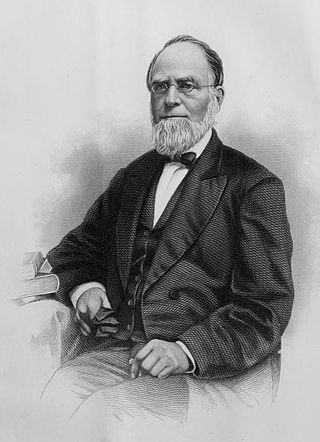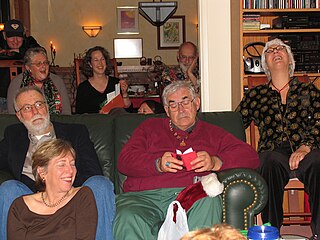Related Research Articles

The Church of Christ, Scientist was founded in 1879 in Boston, Massachusetts, by Mary Baker Eddy, author of Science and Health with Key to the Scriptures, and founder of Christian Science. The church was founded "to commemorate the word and works of Christ Jesus" and "reinstate primitive Christianity and its lost element of healing".

George Edward Moore was an English philosopher, who with Bertrand Russell, Ludwig Wittgenstein and earlier Gottlob Frege was among the initiators of analytic philosophy. He and Russell began deemphasizing the idealism which was then prevalent among British philosophers and became known for advocating common-sense concepts and contributing to ethics, epistemology and metaphysics. He was said to have an "exceptional personality and moral character". Ray Monk later dubbed him "the most revered philosopher of his era".

John Stevens Cabot Abbott was an American historian, pastor, and pedagogical writer born in Brunswick, Maine to Jacob and Betsey Abbott.

Alfred North Whitehead was an English mathematician and philosopher. He created the philosophical school known as process philosophy, which has been applied in a wide variety of disciplines, including ecology, theology, education, physics, biology, economics, and psychology.

Mary Baker Eddy was an American religious leader and author who founded The Church of Christ, Scientist, in New England in 1879. She also founded The Christian Science Monitor in 1908, and three religious magazines: the Christian Science Sentinel, The Christian Science Journal, and The Herald of Christian Science. She wrote numerous books and articles, the notable of which were Science and Health with Key to the Scriptures and Manual of The Mother Church. Other works were edited posthumously into the Prose Works Other than Science and Health.

Paul O. Williams was an American science fiction writer and haiku poet. Williams won multiple awards including the John W. Campbell Award and the Museum of Haiku Literature Award; and was professor emeritus of English at Principia College in Elsah, Illinois and president of the Haiku Society of America.
Robert Arthur Peel was a Christian Science historian and writer on religious and ecumenical topics. A Christian Scientist for over 70 years, Peel wrote editorials for the Christian Science Monitor, a publication owned by the Church of Christ, Scientist. He was also a counsellor for the church's Committee on Publication, set up by Mary Baker Eddy (1821–1910), the religion's founder, to protect her own and the church's reputation.
The Christian Science Hymnal is a collection of hymns used in Christian Science church services including Sunday services and Wednesday evening testimony meetings, as well as in occasional informal hymn sings.
Thomas Godfrey was a glazier and self-taught mathematician and astronomer in the Pennsylvania Colony, who invented the octant in 1730. A similar octant was also independently invented about the same time by John Hadley in London with Hadley receiving the greater share of the credit for development.

Sant Tukaram Maharaj, also known as Tuka, Tukobaraya, Tukoba, was a Hindu, Marathi Saint of Varkari sampradaya" in Dehu village, Maharashtra in the 17th century. He was a bhakt of the god Vithoba of Pandharpur. He is best known for his devotional poetry called Abhanga, which are popular in Maharashtra, many of his poems deals with social reform.

Principia College is a private liberal arts college in Elsah, Illinois. It was founded in 1912 by Mary Kimball Morgan with the purpose of "serving the Cause of Christian Science." "Although the College is not affiliated with the Christian Science Church, the practice of Christian Science is the cornerstone of campus life."
Rushworth Moulton Kidder was an American author, ethicist, and professor. Kidder founded the Institute for Global Ethics in 1990, and is the author of Moral Courage and How Good People Make Tough Choices: Resolving the Dilemmas of Ethical Living. He was born in Amherst, Massachusetts. He worked as a columnist and editor for The Christian Science Monitor. Kidder died in 2012 of natural causes in Naples, Florida at the age of 67. Kidder earned a doctorate from Columbia University in English and comparative literature and wrote the foreword to Compassion Wins, by Godfrey John. He wrote an award winning five-part series on quantum physics in 1988, and his writings appeared in the American Society of Newspaper Editors' Best Newspaper Writing collection.

Vernon Scannell was a British poet and author. He was at one time a professional boxer, and wrote novels about the sport of boxing. He was a famous poet of English.

John "Jack" Broughton was an English bare-knuckle boxer. He was the first person to codify a set of boxing rules; prior to this the "rules" that existed were very loosely defined and tended to vary from contest to contest. His seven rules were widely used in boxing for nearly century, until they were replaced by the London Prize Ring rules in 1838. Pierce Egan characterised Broughton as the "Father of the English School of Boxing".

Robert Michael Pyle is an American lepidopterist, writer, teacher, and founder of the Xerces Society for Invertebrate Conservation. Much of his life story is told in the 2020 feature film The Dark Divide, where Pyle is played by David Cross.
Arthur Godfrey Lias was a British journalist and author, primarily of historical works, as well as a teacher and military officer.
Charles Angoff was a managing editor of the American Mercury magazine as well as a professor of English of Fairleigh Dickinson University. H. L. Mencken called him "the best managing editor in America." He was also a prolific writer and editor.

Rev. Irving Clinton Tomlinson was an American Universalist minister who converted to Christian Science, becoming a practitioner and teacher. For a time, he lived as one of the workers in the household of church founder, Mary Baker Eddy, later writing a book about his experiences called Twelve Years with Mary Baker Eddy.
References
- 1 2 "Christian Science Lecture Scheduled for Monday" Ludington Daily News, Ludington, Michigan (June 13, 1991). Retrieved November 19, 2013
- ↑ "Thanks awfully" Christian Science Monitor (July 24, 2003). Retrieved November 19, 2013
- ↑ Biographical notes, back cover. Five Seasons (1977)
- ↑ "Unforgettable Faculty: College English Professor, Godfrey John". 2009. Principia Purpose. p. 28.
- 1 2 3 Kim Shippey (September 19, 2005). "Writing... a kind of prayer" The Christian Science Sentinel. Retrieved November 19, 2013
- ↑ "Midnight is Our Noon (How Christ Dissolves Crisis)". Vol. 21, no. 6. Lariat. 18 October 1990.
- ↑ John, Godfrey (2001). Compassion Wins: Collected Poems and Essays 1977-2000. Thomson-Shore, Inc. inside cover.
- ↑ "Midnight is Our Noon (How Christ Dissolves Crisis)" Lariat, Vol. 21, Num. 6, 18 October 1990.
- ↑ "Five Seasons by Godfrey John". longyear.org. Longyear Museum.
- ↑ Henrietta Buckmaster. Forward, Five Seasons, p. xv. (1977)
- ↑ Rushworth Kidder. Foreword, Compassion Wins, pp. v-vi. (2001) ISBN 0-9707341-0-7
- ↑ Boundless Light: Poems of Healing. Boston: CSPS. p. 120.